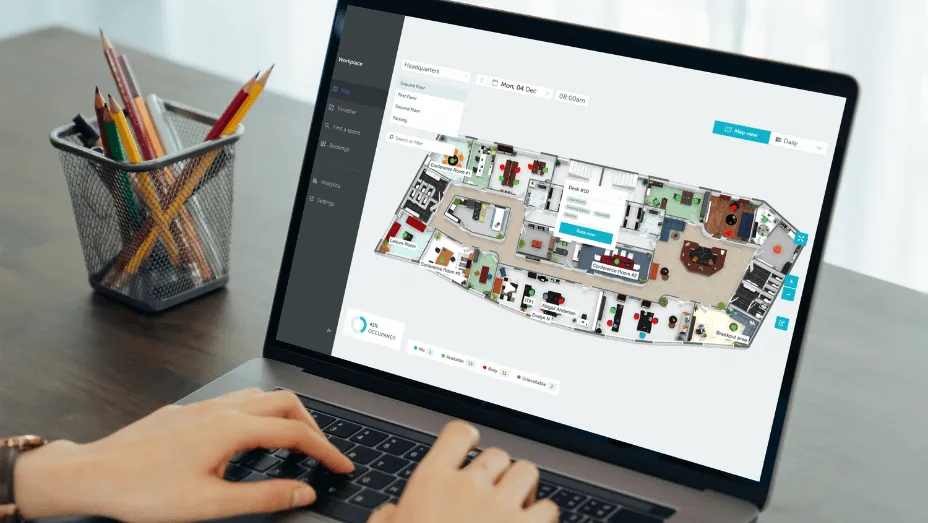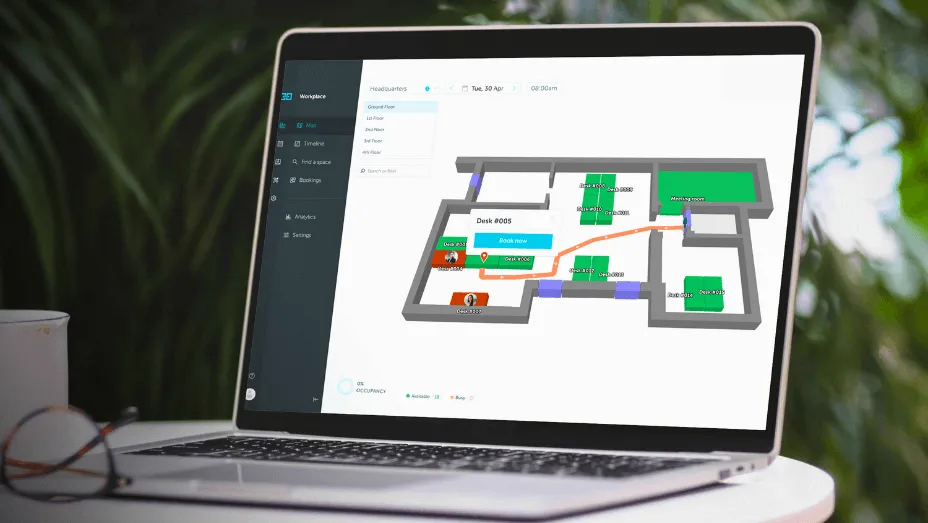Workplace of the Future Technology

The future of our workplaces is continually being constructed and reshaped by technological advancements. Their definitive outlines may not be entirely tangible yet, but we catch glimpses of this evolving landscape each day.
Could your workday soon include collaborating with a robot? Achieving full efficiency with AI-enhanced automation? Or utilizing advanced analytics for decision-making on an entirely different level?
To stay competitive and relevant in tomorrow’s working world, it’s imperative to recognize the impacts engineered by technology today to understand and navigate the spaces where we will spend significant parts of our lives. So, let’s explore the workplace of the future technology!
TL;DR:
- Workplace technology rapidly evolves, reshaping how we work and interact in professional environments.
- Technological advancements like AI, digital collaboration platforms, and advanced analytics drive this evolution.
- A digital workplace uses cloud-based apps and virtual tools to support workers, streamline workflows, and enhance collaboration for the future of work.
- Incorporating advanced technology in the workplace enhances collaboration, efficiency, flexibility, cybersecurity, and workflow integration, ultimately driving productivity and business success.
- The workplace has seen phases of evolution, from the introduction of personal computers to mobile technology and cloud computing.
- Hybrid work models, sustainability concerns, and Generation Z’s influence are shaping the current landscape of workplace technology.
- Embracing technology in the workplace is crucial for staying competitive and relevant.
- Digital employee experience tools and online collaboration platforms foster connectivity and efficiency in dispersed teams.
- AI-based tools, automation technologies, and advanced analytics enhance decision-making, productivity, and performance optimization.
- Challenges include skill gaps, data security concerns, and resistance to change, but opportunities for growth and transformation abound.
What Do We Mean by “Workplace of the Future Technology”?
When we talk about the workplace of the future technology, we refer to pioneering tools poised to fundamentally redefine professional environments. From AI-based solutions to digital collaboration platforms for distributed teams - technology heralds a new era in how we interact, innovate, and deliver within our workplaces. While traditional office spaces have their merits, can they measure against a digitally optimized space infused with smart home tech features for your comfort or use sophisticated data analysis for performance optimization?
What Is a Digital Workplace?
A digital workplace is a tech-driven environment that leverages new technology, such as cloud-based apps, virtual communication tools like Slack, and various types of technology, to support workers in executing their tasks seamlessly. It empowers remote workers to stay engaged and productive by enabling access to a unified digital workspace from anywhere. This integration of digital tools and solutions transforms traditional offices into dynamic work environments, aligning with the future of work by optimizing workflows, enhancing collaboration, and streamlining overall business operations for improved performance.
The Evolution of Workplace Technology
The evolution of workplace technology , deeply intertwined with societal shifts, has seen several phases. Initially, the introduction of personal computers and the internet in the late 20th century marked the first significant leap, transitioning businesses from paper-based systems to digital workspaces. This era democratized access to information and automated many manual tasks, enhancing productivity and fostering global communication.
As we progressed into the early 21st century, mobile technology and cloud computing further revolutionized the workplace, enabling employees to access work-related information and applications from anywhere, effectively decoupling work from a fixed location and setting the stage for flexible work arrangements .
The emergence of hybrid work models , propelled by the global pandemic, has underscored the need for technologies that support remote collaboration and communication, leading to rapid advancements in virtual meeting platforms and project management tools. Sustainability concerns have also played a crucial role, prompting organizations to adopt green technologies and practices, reducing their carbon footprint through energy-efficient devices and cloud computing.
Furthermore, the entrance of Generation Z into the workforce has brought fresh perspectives on technology use, valuing flexibility, digital literacy, and a seamless integration of technology into their work-life balance. This generation’s comfort with digital platforms and appetite for innovation have pushed companies to adopt more agile, responsive, and socially responsible technologies.
Together, these societal factors have shaped the current landscape of workplace technology and are guiding its future direction, ensuring that it evolves to meet the changing demands of the workforce and the planet.

What Are the 5 Advantages of Technology in the Workplace?
In today’s rapidly evolving digital workplace, new technology transforms how workers perform tasks, collaborate, and achieve business goals. From cloud-based solutions to advanced communication tools, technology in the workplace offers numerous advantages that streamline workflows and improve productivity.
Enhanced Collaboration and Communication
With the advent of advanced collaboration tools like Slack and Microsoft Teams, communication within organizations has become more streamlined and effective. These tools enable virtual meetings, instant messaging, and project management capabilities, making it easier for remote and in-office employees to stay connected and collaborate efficiently. As a result, teams can achieve faster decision-making and enhanced productivity, regardless of their physical location.
Improved Efficiency Through Automation
New technologies such as AI-powered software and automation tools significantly reduce the time spent on repetitive tasks. By automating data entry, scheduling, and report generation, workers can focus on more strategic activities that add value to the organization. This increased efficiency reduces operational costs and enhances overall business performance.
Flexible Work Environments
Cloud-based technology has revolutionized how we work, making remote work a viable option for many organizations. Employees can now access their digital workspace from anywhere, enabling flexible work arrangements that cater to a diverse workforce. This flexibility helps companies attract top talent, retain new employees, and easily adapt to the future of work.
Enhanced Cybersecurity Measures
As organizations adopt more digital solutions, cybersecurity becomes a critical concern. Advanced cybersecurity technologies like multi-factor authentication, encryption, and cloud security tools help protect sensitive data and ensure a safe digital workplace. This increased security fosters trust among clients and employees and mitigates risks associated with cyber threats.
Streamlined Workflows with Integrated Software
Technology integrates various business processes, creating seamless workflows that minimize redundancies and enhance coordination between departments. Companies can track progress, set deadlines, and monitor productivity in real-time using cloud-based project management software and other digital tools. These integrated workflows lead to improved project outcomes and a more organized approach to task management.
Importance of Embracing Technological Advancements for Future Workplaces
It’s crucial to note the substantial influence technology has on shaping the future landscape of workplaces. Adjusting to these technological advancements isn’t just a trend; it represents an imperative shift necessary for organizations intending to stay relevant and competitive.
Technology aids businesses in several ways, boosting productivity, efficiency, and innovation. On a broader spectrum, embracing workplace technologies offers benefits such as:
- Reduced operational costs: By automating routine tasks, companies can decrease human intervention and slash operational expenses .
- Increased accessibility: Workplace technology allows employees to access work from any device or location anytime, thus promoting flexibility and inclusivity.
- Improved communication: Digital platforms tighten intra-organizational connections by fostering easy collaboration among remote teams.
Despite these benefits, it is equally important not to gloss over the potential drawbacks of rapid workplace digitization – job displacement being one of them. Studies suggest that approximately two-thirds of US jobs run a medium or high risk of being computerized. Businesses must counterbalance this potential drawback through strategies like continuous learning programs or redeployment opportunities for affected employees.
The Impact of Hybrid Work Environments on Future Workplace Technology
The advent of hybrid work environments has significantly influenced the trajectory of future workplace technology, underscoring the critical need for innovation in collaboration, connection, and experiential elements. As organizations blended remote and in-office work modalities, a burgeoning demand for technologies seamlessly integrating these diverse workspaces appeared. This has led to the development of sophisticated collaboration tools, virtual meeting platforms, and full-fledged workplace experience software solutions that facilitate efficient communication and collaboration in hybrid setups.
Enhanced digital interfaces are now designed to provide immersive experiences that bridge the physical distance, fostering a sense of belonging and engagement among team members. Moreover, the hybrid model emphasizes the importance of flexible, employee-centric technologies that can adapt to individual needs and preferences, enhancing productivity and well-being.
As we move forward, the evolution of workplace technology will continue to be shaped by the imperative to create cohesive, inclusive, and adaptable environments that cater to the dynamic nature of hybrid work .
8 Key Technologies Shaping the Future Workplace
As we chart our course for tomorrow’s work landscape, fundamental technologies underpinning this shift can’t be ignored. Let’s explore eight of them!
#1: Digital Employee Experience Tools Enhancing Hybrid Work Experiences
Digital Employee Experience (DEX) tools stand at the forefront of transforming workplaces. These innovative solutions are crucial for organizations striving to navigate the complexities of today’s hybrid work environment, where the line between physical and virtual offices continues to blur.
DEX tools offer unprecedented visibility into the workforce, enabling managers and teams to know who is working when. This visibility is not just about monitoring office attendance ; it’s about fostering a sense of unity and coherence within the team, ensuring that everyone feels included and valued, whether in the office or working remotely.
One of the standout innovations in this arena is the development of specialized hybrid work calendars , such as one offered by YAROOMS. They empower employees to independently create and adjust their hybrid work schedules , promoting a balance between professional and personal life. Furthermore, they enhance team dynamics by offering visibility into colleagues’ schedules, facilitating easier planning and coordination of teamwork. By eliminating logistical hurdles and fostering a flexible, inclusive work setting, these experience-oriented calendars are pivotal in optimizing the hybrid work model, ensuring teams can thrive in today’s evolving workplace landscape.
By enhancing the digital employee experience through solutions like this, organizations are optimizing operational efficiency and nurturing a culture of teamwork, innovation, and resilience crucial for future workplace success.
#2: Online Collaboration and Communication Platforms Fostering Connectivity in Dispersed Teams
In the current global business environment, it’s essential to maintain high team performance across distances. Online communication and collaboration technologies are imperative, transforming how remote teams function.
Consider the essential tools: video conferencing, instant messaging, and shared document platforms. Each contributes differently to connectivity and inclusion:
- Video conferencing brings a personal touch to remote work, offering real-time discussions.
- Instant messaging facilitates quick information exchange and decision-making, enhancing community.
- Shared document platforms enable concurrent editing and idea exchange, improving workflows and productivity.
Together, these technologies do more than just facilitate work; they reinforce team spirit and camaraderie among the hybrid workforce . They create an engaging and dynamic workplace environment that transcends geographical constraints. By leveraging these platforms, teams not only overcome the challenges posed by distance but also unlock new levels of creativity and efficiency. This digital revolution in team collaboration and communication is reshaping the future of workplaces, proving that even when apart, teams can still achieve remarkable synergy and performance.
#3: AI-Based Tools for Enhanced Decision-Making and Automation Processes
Integrating AI-based tools into decision-making and automation processes significantly transforms the future of workplaces. These tools are designed to analyze vast amounts of data, recognize patterns, and make predictions with speed and accuracy that far surpasses human capabilities. For instance, AI-driven analytics can identify operational inefficiencies, allowing businesses to stay competitive and responsive to changes. Furthermore, repetitive task automation frees employees to focus on more strategic and creative endeavors, enhancing productivity and driving growth.
As AI technology continues to evolve, it is becoming an indispensable component of the modern workplace. Businesses that adopt AI tools are finding themselves at a significant advantage, able to streamline operations, reduce costs, and accelerate their response to market demands. This technological shift is not just about keeping up with competitors but setting the stage for future innovation and success.
Moreover, the importance of AI to the employee experience cannot be overstated. By automating mundane and repetitive tasks, AI allows employees to engage in more meaningful work, boosting job satisfaction and overall morale. AI-powered tools can also offer personalized learning and development opportunities or identify areas for improvement in team dynamics and employee engagement. In this way, AI not only enhances the operational aspects of a business but also significantly contributes to creating a more fulfilling and productive work environment for employees . It shows that the future of the workplace is not just about technological advancement but about leveraging technology to make a more engaging, empowering, and efficient work experience.
Short video from Workplace Whiz Podcast. Watch the full episode here.
#4: Adoption of Device-Agnostic Workplace Technology for Seamless Connectivity
The adoption of device-agnostic workplace technology marks a significant evolution in how we envision and interact with digital tools in the workplace. This technology transcends traditional limitations by ensuring that software applications perform consistently and reliably across various devices, whether smartphones, tablets, laptops, or computers.
This universal compatibility ensures that employees can access critical business applications and data from anywhere, at any time, fostering a flexible work environment . Device-agnostic technology becomes essential in supporting a dynamic workforce that values convenience, agility, and the freedom to choose how and where they work.
Moreover, this shift towards device-agnostic workplace technology is reshaping the future workplace by laying the foundation for a more inclusive and collaborative work culture. It democratizes access to information and tools, ensuring that all team members, regardless of their preferred devices or locations, can fully participate in collaborative processes and decision-making. This level of seamless connectivity enhances overall work productivity and encourages innovation and teamwork by facilitating easier sharing of ideas and resources.
As organizations continue to adopt device-agnostic platforms, we can anticipate a significant transformation in workplace dynamics, where the focus shifts from managing technology compatibility issues to leveraging digital tools in the most effective and productive ways possible. The result is a more efficient, adaptable, connected workplace , ready to meet future challenges.
#5: Automation Technologies for Increased Efficiency and Reduced Manual Tasks
Office automation technologies fundamentally transform the workplace, setting the stage for a future where efficiency and productivity are unprecedented. By taking over repetitive and time-consuming tasks, these technologies allow employees to focus on more strategic, creative, and value-added activities.
Moreover, automation technologies are instrumental in streamlining operations and optimizing resource allocation, leading to cost savings and improved operational efficiencies. By automating processes, businesses can ensure that tasks are completed faster and with greater accuracy, reducing the need for manual intervention and the potential for errors . Furthermore, the data generated by automated systems can provide valuable insights into operational performance, enabling more informed decision-making and strategic planning. As a result, automation becomes a critical component in shaping a more agile and responsive future workplace.
A practical example of automation in the workplace is the hot desk booking software , replacing manual workspace reservations with Excel, WhatsApp, or paper logs. Instead of manually checking for available desks or meeting rooms, employees can use an app or software to book hot desks based on availability, preferences, and team location. This saves time, reduces the administrative burden on staff, and ensures optimal use of office space and resources. By simplifying such everyday tasks, automation technologies are a must-have in the future workplace, paving the way for a more efficient, productive, and error-free environment.

#6: Advanced Analytics for Data-Driven Insights and Performance Optimization
Advanced workplace analytics are revolutionizing the workplace by enhancing decision-making and operational efficiency . By leveraging complex datasets, organizations can make informed decisions based on predictive models and real-time insights rather than relying solely on intuition. This leads to strategic planning, optimized operations, and automated processes that significantly increase productivity and reduce costs.
But where to get this data?
Today, many valuable insights can be accessed through workplace experience platforms , which consolidate all workplace management data in one place. These platforms empower organizations with strategic planning, optimized operations, and automated processes, significantly increasing productivity and reducing costs.
The future workplace will be more efficient, innovative, secure, and compliant, underscoring the strategic importance of advanced analytics in driving business success and shaping future-ready organizations.
#7: Wayfinding, Floor Maps, and Other Advanced Tools For Smooth Office Experience
Office wayfinding , wayfinding signage , and indoor mapping technologies mark a significant leap in how workspaces are utilized and managed. These technologies provide a seamless navigation experience, quickly guiding employees through complex office layouts . This is not just about finding the quickest route to a meeting room; it’s about creating an intuitive environment where resources and spaces are utilized to their fullest potential.
Moreover, in today’s workplace, wayfinding technologies are crucial in enhancing employee safety. In emergencies, having an efficient indoor navigation system can be lifesaving, directing employees to the nearest exits or safe zones quickly and effectively.
Looking ahead, the evolution of wayfinding technologies signals a promising direction for future workspace management technology. Imagine a workspace where environmental conditions, occupancy, and resource availability are all synchronized in real-time, optimizing the workplace experience. As these systems become more sophisticated, incorporating real-time updates, interactive floor maps , and integrating with other smart workplace solutions , they pave the way for a more connected and intelligent work environment.

Office wayfinding in action: YAROOMS Workplace Experience Platform
#8: Workplace Technology for a Sustainable Future
Sustainable workplace technology represents a pivotal evolution in the design and operation of future workplaces. This shift signifies a profound commitment to preserving our planet for future generations while fostering a workplace culture of innovation and responsibility.
Sustainable technologies help reduce carbon footprints, conserve energy, and minimize waste, aligning corporate operations with global sustainability goals. As businesses become increasingly aware of their environmental impact, adopting such technologies becomes crucial in demonstrating a commitment to environmental stewardship. Moreover, it positions companies as forward-thinking and responsible entities in the eyes of consumers, employees, and stakeholders, enhancing their brand image, competitiveness, and financial performance .
Challenges and Opportunities Presented by Future Workplace Technologies
The integration of future workplace technologies presents both challenges and opportunities for organizations. On the one hand, embracing these advancements can enhance productivity, collaboration, and innovation. However, navigating the complexities and ensuring a smooth transition poses significant hurdles. Some of the key challenges include:
- Skill Gaps: Implementing new technologies often requires upskilling or reskilling employees to leverage these tools effectively.
- Data Security Concerns: With the adoption of cloud computing and IoT devices, organizations face increased risks of data breaches and cyberattacks.
- Resistance to Change: Employees may resist adopting new technologies due to fear of job displacement or unfamiliarity with the tools.
- Integration Issues: Ensuring seamless integration of various technologies within existing systems can be challenging, leading to operational disruptions.
- Cost and Resource Allocation: Investing in new technologies requires significant financial resources and careful allocation to ensure maximum ROI .
Despite these challenges, future workplace technologies offer numerous opportunities for organizations to thrive:
- Enhanced Efficiency: Automation and AI-driven solutions can streamline repetitive tasks, allowing employees to focus on more strategic endeavors.
- Remote Work Flexibility: Advanced communication and collaboration tools facilitate remote work arrangements, promoting work-life balance and widening the talent pool.
- Innovation and Creativity: Access to big data analytics and virtual reality technologies fosters innovation and creativity, driving competitive advantage.
- Improved Decision-Making: Predictive analytics and machine learning algorithms enable data-driven decision-making, leading to better outcomes.
- Global Connectivity: Emerging technologies break down geographical barriers, enabling worldwide connectivity and collaboration among diverse teams.
By addressing the challenges and capitalizing on the opportunities presented by future digital workplace technologies, organizations can stay competitive and adapt to the evolving business landscape.
Embracing Innovation in Workplace Technology for a More Efficient Future Work Environment
As we journey through the ever-evolving landscape of the workplace of the future technology, it becomes evident that the future holds boundless opportunities for organizations willing to embrace innovation. From AI-driven automation to sustainable workplace practices, the advancements we witness today are profoundly shaping tomorrow’s work environment.
Organizations can chart a course toward greater efficiency, collaboration, and success by recognizing the challenges and opportunities presented by future workplace technologies. However, this journey isn’t without its hurdles. Skill gaps, information security concerns, and employee resistance to change pose significant challenges that must be addressed with strategic planning and foresight.
Yet, amidst these challenges lie immense opportunities for growth and transformation. Enhanced efficiency, remote work flexibility, and improved decision-making are benefits awaiting those who dare to innovate. By harnessing the power of emerging technologies, organizations can create productive, resilient but also inclusive, sustainable, and future-ready workplaces.
In essence, the path forward is clear: by embracing innovation in workplace technology, we can pave the way for a more efficient, collaborative, and fulfilling future work environment. Let us embark on this journey together, shaping tomorrow’s workplaces today.
Workplace of the future. Today.
See how YAROOMS integrates with Microsoft 365 to create a seamless workspace booking experience.